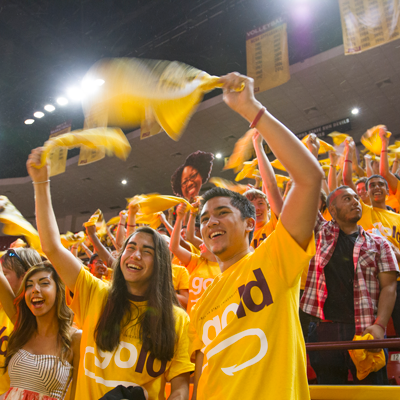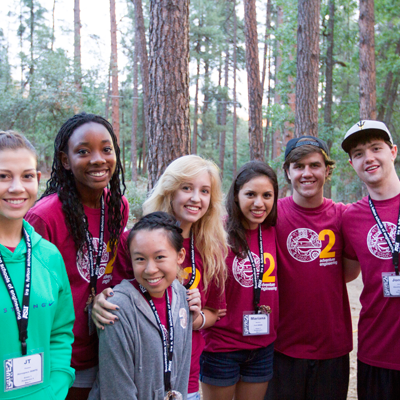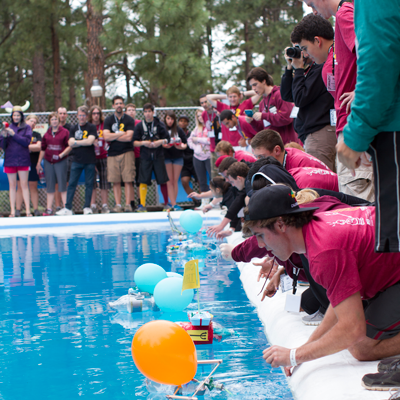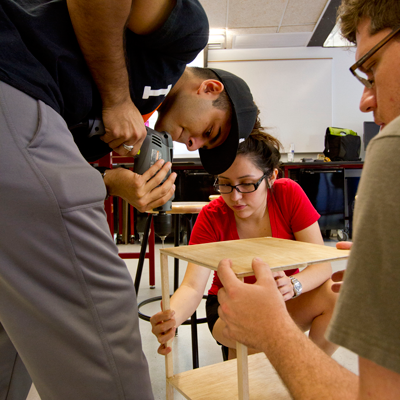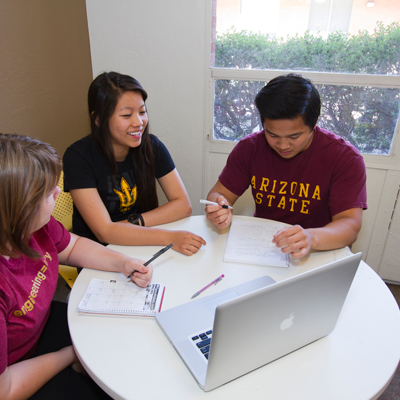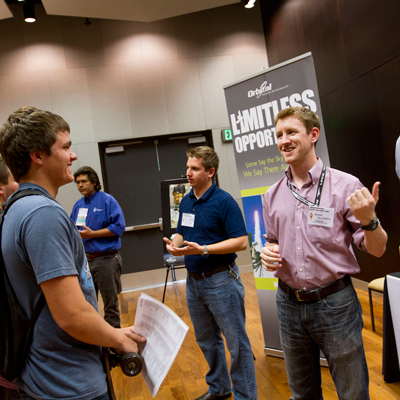
Engineering a big welcome
Largest freshman engineering class gets an extensive introduction to ASU culture and community
Posted October 23, 2013
Arizona State University’s Ira A. Fulton Schools of Engineering enrolled a record number of freshmen for the 2013 fall semester – a class of more than 1,750 that is up 14 percent from fall semester a year ago and double the freshman enrollment of five years ago.
It’s an assemblage of new college engineering students that is notable for more than its size.
One of every four new freshman engineering majors is an honors student, enrolled in ASU’s Barrett, The Honors College.
Eighty-five percent of the class has a merit scholarship of some kind, including 47 National Merit Scholars, two National Achievement Scholars and 34 National Hispanic Scholars.
New students have come from 46 states (65 percent from Arizona) and 23 countries. Ten percent are international students.
The record-setting and impressive freshman class was appropriately welcomed with the most extensive slate of orientation activities ever offered by the Fulton Engineering Schools.
“Our goal is that no engineering student feels lost in the crowd. We provide the support and individual attention they need to be successful,” says Paul Johnson, dean of the engineering schools.
“We create opportunities for our new students to interact with faculty and staff and, most importantly, with each other. We prepare them for the university environment, for academic challenges, and have numerous options for them to do engineering outside the classroom,” Johnson says. “And we try to get them focused from the start on the qualifications and experiences they want to have on their resume when they graduate.”
Part of a community
The introductions began this year – as it has since 2008 – at E2 Camp, where freshmen spend one of six two-and-a-half-day sessions amid summer-camp environs in the forested high country of northern Arizona near Prescott.
About three-quarters of freshman engineering majors have been attending the camp each year to get a “low-pressure” immersion into the world of the Fulton Schools of Engineering, says Becca Salay, senior coordinator of First-Year Programs for freshmen.
“There is where they can start to see that we are all in this together. They meet other students, faculty and staff and student mentors, and they learn that we want to know them, that they are part of a community and that they have our support,” Salay says.
Games and other activities are designed to foster team building, critical thinking and problem solving in an atmosphere of camaraderie, she says.
And the freshmen see that the engineering schools’ approach to education does not exclude having fun, including the use of squirt guns and water balloons.
“I doubt there are many other places where the dean of the school is willing be on the receiving end of many, many water balloons,” Salay says.
One measure of a blossoming of the E2 Camp tradition: Upperclassmen and Fulton Engineering alumni who attended the previous camps now take the time to come back and serve as mentors to freshmen.
With growth of engineering freshman enrollment expected to continue, there are plans to add two camp sessions by next year.
Student organizations and research
On campus, in the days just before the start of classes, freshmen and new ASU transfer students can also attend the Engineering Student Organization and Resource Fair. The event provides an information-intensive introduction to an array of opportunities the students will have available to them throughout their academic careers at ASU.
This year the fair gave them a look at the activities of most of the 50 or so engineering student organizations, clubs and competitive teams. In addition, they learned about engineering library and tutoring services, study-abroad programs, and the services of the Fulton Engineering Schools Career Center.
Students got details about the Fulton Undergraduate Research Initiative (FURI) that provides support for undergrads to engage in research under the mentorship of engineering faculty members. They learned about the Engineering Projects in Community Service (EPICS). program that enables students to put their classroom learning to work by aiding nonprofit organizations and community improvement projects.
“We want to get new students engaged in student organizations and activities as soon as possible because these are opportunities to reinforce and use what they are learning in classrooms, and to begin making connections with people in the industries they want to work in. And they will always be able to find things to do that relate specifically to their majors,” says Amy Sever, the Fulton Engineering Schools associate director for student engagement.
Exploring engineering pathways
Freshmen are also introduced to the Grand Challenge Scholars program that places students on a course of study guided by the National Academy of Engineering’s “Grand Challenges” – a list of technological advances that will be needed to improve the quality of life around the world in the 21st century and will require the contributions of visionary engineers.
More than 140 incoming freshmen have been admitted to the program. Forty of them attended a weeklong summer campus residency session to prepare them to meet their responsibilities as Grand Challenge Scholars.
Nearly all freshman engineering students are enrolled in the ASU 101 course and the FSE semester-long Introduction to Engineering course.
The ASU course provides an extensive introduction to the wide range of student resources and opportunities throughout the university. It also guides students on how to customize their academic experiences to align with their career aspirations.
The FSE course introduces engineering majors to the engineering design process and encourages them to take creative approaches to seeking solutions to engineering problems related to challenges facing the world. Students get the opportunity in the course to work in teams on significant design projects.
It also focuses on students’ technical communication and teamwork skills, and their understanding of the research process.
“We want them to understand what kind of education they will need to become an engineer, and all the possibilities of where engineering can take them,” says Carrie Robinson, associate director of academic achievement for Fulton Engineering Schools.
Getting connected
With growing numbers of students from a variety of countries coming to ASU for engineering education, there are plans for additional outreach to international students.
“We need to bridge cultural differences, because some of the international students are not accustomed to our country’s educational environment,” Robinson says. “We want to make sure they have a good understanding of our education system and that we give them a support structure to integrate into to it.”
Such a support structure for freshman engineering students is already integrated into campus residential life. Most freshmen live in two residence halls reserved exclusively for engineering majors. Some of the others live in the Barrett honors college residential complex. There are now 21 peer mentors in the residential facilities who work to help keep new engineering students on track academically.
The mentors “organize study groups and competitions and other things to remind students that they have goals here and that there are resources to help them realize those goals. We want to infuse the engineering identity into the student living environment,” says Salay, the senior coordinator senior of First-Year Programs, who coordinates the engineering schools’ campus residential life program in addition to E2 Camp.
This year there’s also a pilot program to provide peer mentorship to the roughly 30 percent of freshmen who live off campus, as well as about 20 online freshman students. “We want all of them to feel connected to ASU and the engineering community here,” Salay says.
Guidance from peers and professors
In addition to peer mentorship, freshmen can get help from more than 30 tutors at two campus tutoring centers dedicated exclusively to engineering majors [http://tutoring.engineering.asu.edu/]. One focuses on most math, science and engineering classes, the other on computing. Students can find tutors to help with studies in all branches of engineering at one or other center.
New this year is Adventures in Engineering, a freshman lecture series. It includes five separate lectures featuring Fulton Engineering Schools Dean Paul Johnson and four other faculty members expounding on the engineering life.
“Students will get to see professors geek out about engineering, to hear about what motivated them to become engineers and what inspires them about their work,” Salay says.
First steps on career track
Only a few weeks into the semester, the new ASU students had already been to their first big event to connect with professional engineers. Engineering Career Exploration Night, designed specifically for freshmen, brought about 300 engineers to campus – both ASU alumni and representatives from companies that employ engineers. More than 1,800 freshmen and other students attended the event this semester.
The event is designed to help new students “see what their engineering career paths could look like and to inspire them with real-life examples of how engineers make a difference in the world,” says Robin Hammond, Fulton Engineering Schools Career Center director.
Career Exploration Night “is a cornerstone in creating a culture in which our students of themselves as Fulton engineers from day one in college,” she says. “We want our freshmen to develop a mindset early on that is focused on career and professional leadership development. Our goal is to have them internship ready within four semesters.”
Beyond the event, freshmen are further aided in adopting that mindset by a team of 10 peer career coaches assembled from leaders of student organizations and other high achievers among ASU’s engineering students.
The career coaches do outreach to students through the engineering residential community, by conducting career planning workshops and even in one-on-one meetings.
“We strive to make it easy for students to engage with us,” Hammond says. “We want them to know that we are all about caring that they succeed.”
Media Contact:
Joe Kullman, [email protected]
(480) 965-8122
Ira A. Fulton Schools of Engineering































